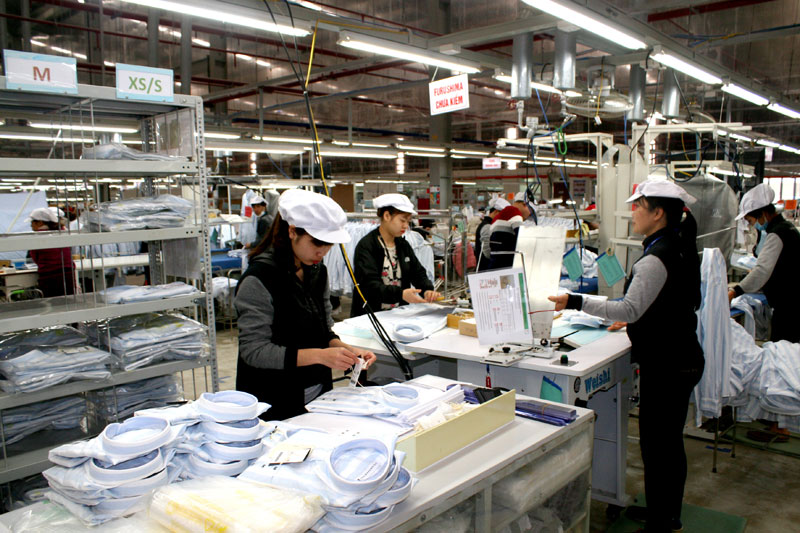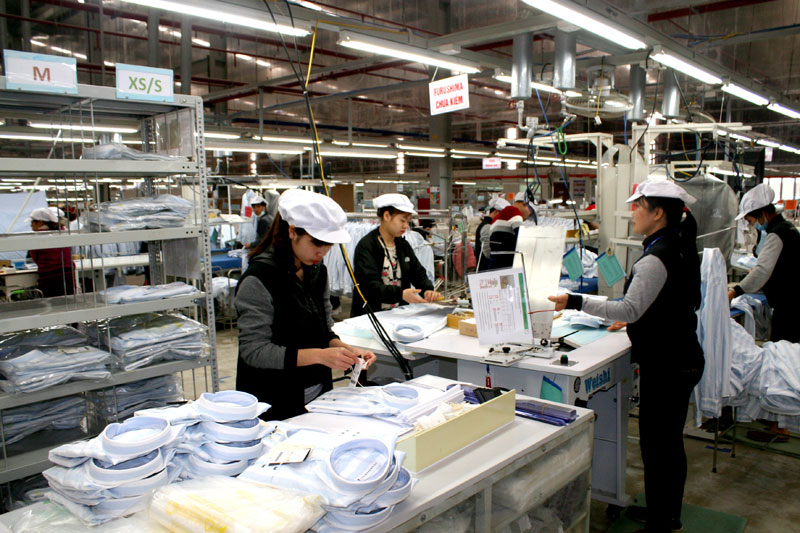
(HBO) – Businesses at industrial parks in the northern province of Hoa Binh are eager to carry out production plans after the week-long Lunar New Year holiday. Business activities as well as the living standards of employees are expected to be improved in this year.
Workers at Esquel Garment Manufacturing Company
at Luong Son industrial park come back to work, engaging in production
emulation campaigns 2018.
From the fifth day of the lunar New Year or February 20 this year,
Esquel Garment Manufacturing Company resumed operation. Workers have been actively
responding to 2018 production emulation campaigns.
The company is generating jobs for 4,000 workers
with monthly income of 5 million - 6 million VND each. Compared to previous
years, the living standards of workers at the company have been remarkably
improved.
Do Hanh, a representative from Esquel, said the
company is launching emulation campaigns to increase productivity and quality
of products as well as complete orders from partners.
The group is pouring investment into production expansion
at Luong Son industrial park, which is expected to draw more 1,000 employees in
2019, she added.
Meanwhile, nearly 300 workers at Hoa Binh
Koyueni Garment joint Stock Company have come back to work. Chairman of the
Board of Directors Dao Hong Son said the company received investment license in
2016 and put into operation in April 2017, specialising in socks production for
shipment to
Japan.
It has signed orders for the whole 2018.
After Tet, many businesses such as Sankoh Co.,
Ltd., R Lens Co., Ltd., Vietnam GGS Garment Company, Doosung Tech Vietnam Co.,
Ltd., ViNa HNT, Nissin Manufacturing Vietnam, Seyong INC, Midori Apparel
Vietnam have
resumed operation.
Deputy Head of the management board of
industrial parks Duong Nhu Ru said most of businesses have resumed their
operations following the week-long Tet holiday. The proportion of workers back
to work was high. In 2018, most of foreign direct investment (FDI) firms aim to
increase production value. Many set ambitious goals of doubling products
against last year. Such companies as Koyuseni, Seyuong and Esquel have received
orders for the whole 2018./.
According to data from the Hoa Binh Provincial Party Committee, the industrial production index for the first six months of 2025 is estimated to have increased by 20% compared to the same period last year. This marks the highest year-on-year growth rate for this period since 2020.
In the first six months of 2025, Hoa Binh province’s export turnover was estimated at 1.145 billion USD, marking an 18.11% increase compared to the same period in 2024. Import turnover was estimated at $ 804 million, a 17.15% increase, which helped the province maintain a positive trade balance.
The lives of the ethnic minority farmers in Tan Lac district have gradually improved thanks to the new directions in agricultural production. This is a testament to the collective strength fostered through the professional associations and groups implemented by various levels of the district’s Farmers’ Union.
With the motto the "product quality comes first,” after nearly one year of establishment and operation, Muong village’s Clean Food Agricultural and Commercial Cooperative, located in Cau Hamlet, Hung Son Commune (Kim Boi district), has launched reputable, high-quality agricultural products to the market that are well-received by consumers. The products such as Muong village’s pork sausage, salt-cured chicken, and salt-cured pork hocks have gradually carved out a place in the market and they are on the path to obtaining the OCOP certification.
In the past, the phrase "bumper harvest, rock-bottom prices" was a familiar refrain for Vietnamese farmers engaged in fragmented, small-scale agriculture. But today, a new spirit is emerging across rural areas of Hoa Binh province - one of collaboration, organisation, and collective economic models that provide a stable foundation for production.
Maintaining growing area codes and packing facility codes in accordance with regulations is a mandatory requirement for agricultural products to be eligible for export. Recently, the Department of Agriculture and Environment of Hoa Binh province has intensified technical supervision of designated farming areas and packing facilities to safeguard the "green passport" that enables its products to access international markets.



